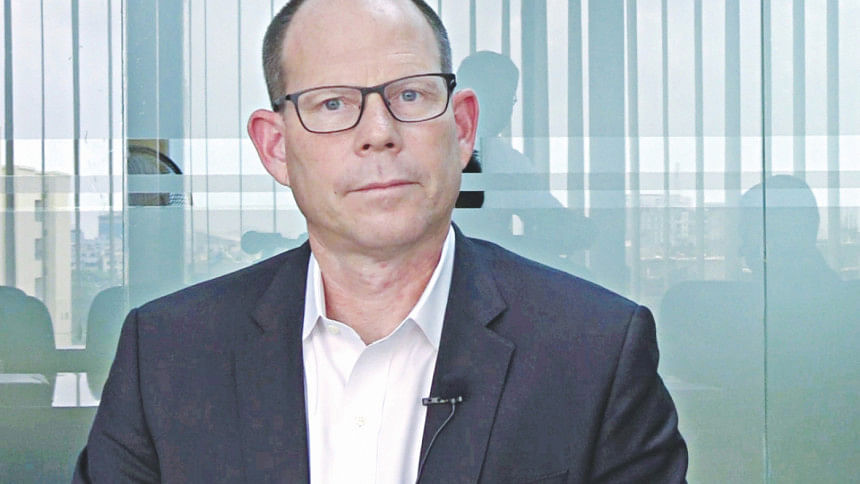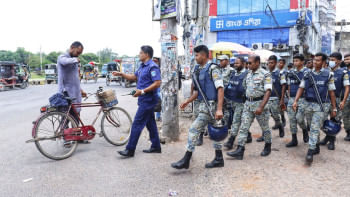Investment in health gives 10 times more return

Bangladesh should increase its investment in social sectors such as health, education and nutrition to build a healthy population and enjoy demographic dividend, said a senior official of the Bill & Melinda Gates Foundation.
“Investment in health gives 10 times more return and that’s a conservative number,” Mark Suzman, chief strategy officer and president of the foundation’s global policy and advocacy, told The Daily Star in an interview in Dhaka recently.
Ten was the lower number and the foundation-commissioned study says the return on health is between 10 and 17 times.
“That return takes place over 25 years. And if you look over the cycle of the economy, the benefits are indisputable,” he said, adding that the higher allocation for education and health in fiscal 2019-20’s budget was encouraging.
The foundation strongly believes the basic investment on health start before pregnancy, and Bangladesh still has a very extensive stunting problem.
“Stunting is extremely damaging to you because if you don’t get full proper nutrition in the first two years of life and particularly in the first six months, your brain will never fully recover and develop into what it would have been otherwise.”
“That’s a huge tax on future generations and the future workforce. So, we believe it’s critically important that those investments be prioritised now and then naturally the demographic dividend actually comes into being.”
Set up in 2000, the Bill & Melinda Gates Foundation is a private foundation founded by the Microsoft founder and his wife and is the largest transparently operated private foundation in the world.
Based in Seattle, the foundation’s total grant payments since inception was $50 billion. Last year, the total direct grantee support was $5 billion, up from $4.7 billion a year earlier according to the charitable organisation’s website.
Historically, it has focused on global health and health-related issues. It also focuses on areas that could have catalytic effect on poverty, such as agricultural development, access to sanitation and financial inclusion.
It has been working extensively in Bangladesh for more than a decade. The areas include nutrition, agriculture research, health and financial inclusion.
“What we are doing are aligned with the priorities of the government.”
Over the last 10 years, it has provided about $250 million directly and another $100 million indirectly to Bangladesh. It works through 60 to 70 partners.
It has been a long-term supporter of the International Centre for Diarrhoeal Disease Research, Bangladesh (ICDDR,B).
It has a partnership with the Bangladeshi Rice Research Institute (BRRI) to help it develop more robust hybrid rice seeds that are both more drought- and flood-resistant and are often with improved food fortification.
“The ICDDR,B and the BRRI are the examples of models that we would love to be replicating in some other countries.”
In Bangladesh, it also finances a lot of the big international agencies such as the Global Alliance for Food Security and the GAVI Alliance and the Global Fund to Fight HIV, TB and malaria.
It primarily provides grants as well as a combination of financial and technical support.
“It is a two-way partnership: we learn a lot from what our partners here are doing, which often can be relevant for our work in other countries.”
It has been partnering with Brac for well over a decade in multiple areas.
“We have been increasing our work steadily,” said Suzman, who joined the foundation in 2007 as the director of global development policy, advocacy, and special initiatives.
In 2012, he was appointed president of global policy, advocacy and country programmes, and in 2016 he was given an additional title: the foundation’s first chief strategy officer.
Bangladesh has made impressive progress over the last decade in bringing down child and maternal mortality and overall poverty rates, said Suzman, a South African national.
The child mortality numbers are a big contributing factor and Bangladesh has an excellent track record in vaccine delivery.
“But even when you have progress like that, there’s still more to be done.”
The foundation is a big financial supporter of the GAVI, a global vaccine alliance through which Bangladesh procures most of the standard vaccines at a much lower price.
But Bangladesh’s graduation into the lower middle-income bracket means it might lose the eligibility to the discounted GAVI rates.
“Bangladesh will now have to start paying a little bit more for vaccines because you’re a wealthier country. It’s a similar problem that a country like Vietnam is having right now.”
During the visit, Suzman met with the principal coordinator of the government on Sustainable Development Goals and the planning minister to see how the foundation’s interventions can contribute to areas such as health, agriculture and nutrition, where there is potential for improvement.
Bangladesh did very well and very badly in the World Bank’s recent Human Capital Index, he said.
The country is one of the best performers in South and East Asia and performs better than India. It showed significant improvements in investment in education and health, the two main contributing factors to human capital.
On gender equity, he said there has been important progress but it is not as much as it should have been.
The Gates Foundation has also some activities in the area of climate change. Bangladesh is one of the biggest victims of the changing climate and hosted the Global Commission on Adaptation meeting in Dhaka last month.
The purpose of the meeting was to determine how to help the adaptation process of countries like Bangladesh that actually contributed relatively little to climate change but are disproportionately affected by the results.
“And one of the discussions I was having with the foreign minister was how we can combine our voices and the voice of the government of Bangladesh at the upcoming UN General Assembly where there is going to be a big climate summit to focus on these kinds of issues, which we feel not enough attention has been paid to.”
Unlike the Millennium Development Goals, the SDGs will have to be implemented by the respective countries.
For Bangladesh, it will need $1 trillion to meet the goals, and the financing challenge is a very real one.
Financing should come from three sources: the government, the private sector and international aid agencies, donors and philanthropies like the Gates Foundation.
The biggest pool and the most important is the domestic resources of the country itself and how it is mobilised.
Bangladesh has made some improvements but by international comparisons, it still has a relatively low percentage of the GDP captured as a sort of tax and governmental revenue.
“You’re not going to be successful if that doesn’t increase significantly over the next decade.”
The private sector can think about how it can contribute to achieving the SDGs through businesses directly and through corporate social responsibility indirectly.
Bangladesh has put in place an SDG tracker to measure the progress in real time and check accountability.
“That’s exactly the kind of model we think other countries should be following,” said Suzman, who holds a doctorate in international relations from Oxford University and earned his bachelor’s degree from Harvard University.

 For all latest news, follow The Daily Star's Google News channel.
For all latest news, follow The Daily Star's Google News channel. 



Comments